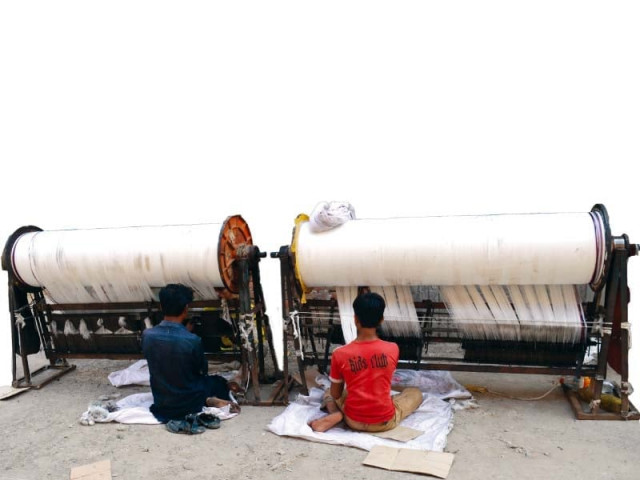Poor working conditions: Power loom workers face risk of fatal diseases
The hard work of power loom workers adds billions of dollars to the national exchequer

Poor working conditions: Power loom workers face risk of fatal diseases
The loom workers are the main source of achieving prosperity of the textile and its ancillary. However, an overwhelming majority of the workers are not only deprived of their legitimate benefits but also forced to work in a hostile environment.
Power loom workers have staged a number of demonstrations in the recent past against the failure of labour department and other government functionaries, but no action has been taken to improve their working conditions. These power looms lack even the basic facilities and do not offer service protection, old age benefits or social security to their workers. The workers complained that they were being paid very low wages for their 12 hours of hard work without any fringe benefits.
Power Loom: Industry demands bailout package
There is no such thing as weekly holidays, causal leaves, medical leaves and earned leaves in the lives of these workers. No appointment letter is issued to them at the time of appointment so as to deprive them of privileges as described in the labour laws. The workers are forced to work round the clock during peak days by the owners.
Moreover, the working conditions of these factories totally disregard environmental standards with no proper ventilation system, light, washroom, drinking water, fire-fighting system, security and emergency medical arrangement.
The workers also complained about the negligence of factory owners to protect the workers from cotton dust, which is the main cause of chronic diseases like asthma, tuberculosis, skin disease, hepatitis, cancer, blood pressure, diabetes, respiratory issues and heart problems.
Talking to The Express Tribune, renowned trade union leader of the city Muhammad Aslam Wafa said it was very unfortunate that the hard work of power loom workers brings billions of dollars in foreign exchange but they get painful silence and intimidation in return.
“These workers are made to work in two shifts against very low wages. At times, workers do not get paid over time for their extra hours,” he said.
He pointed out that despite the minimum wage limit set by the government to be Rs14,000 per month, the factory owners do not follow the rules.
Abdul Latif, a power loom workers’ union leader, said high noise pollution has affected the power of hearing of the workers.
A social activist Naseem Anthony said most of the power loom factories were located in the residential areas of Faisalabad and pose threat of diseases to the residents. Moreover, the residential areas have seen an increase in crimes, he said.
Commenting on the demands made by the factory workers, Power Looms Owners Association Chairman Waheed Rammy told The Express Tribune that non-availability of electricity, theft and looting in the outskirts were the reasons many factory owners chose to set up factories in the residential areas. He said power looms sector was facing a crunch for past two years since the exports have declined by 13%. A number of factory owners have become bankrupt due to excessive rates of electricity, labour and yarn cost.
Resisting Robbery Bid: Factory worker shot dead in Faisalabad
He claimed that facilities of clean drinking water, washrooms and ventilation were available at 80% of the factories. “The factory owners are following the minimum wage requirement as described by the government for the last eight years,” he said.
Workers’ union leaders said the authorities should take action to address the issues of power loom sector in order to boost exports and provide better working conditions to the workers.
Published in The Express Tribune, July 2nd, 2017.



















COMMENTS
Comments are moderated and generally will be posted if they are on-topic and not abusive.
For more information, please see our Comments FAQ